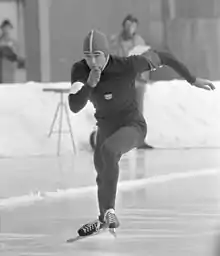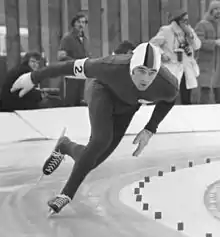Erhard Keller
Erhard Keller (born 24 December 1944) is a former speed skater from Germany.[1]
 Keller in 1971 | |||||||||||||||||||||||
| Personal information | |||||||||||||||||||||||
|---|---|---|---|---|---|---|---|---|---|---|---|---|---|---|---|---|---|---|---|---|---|---|---|
| Born | 24 December 1944 Günzburg, Bavaria, Germany | ||||||||||||||||||||||
| Height | 1.83 m (6 ft 0 in) | ||||||||||||||||||||||
| Weight | 78 kg (172 lb) | ||||||||||||||||||||||
| Sport | |||||||||||||||||||||||
| Sport | Speed skating | ||||||||||||||||||||||
| Club | MEV, München; DEC Frillensee, Inzell | ||||||||||||||||||||||
Medal record
| |||||||||||||||||||||||
Career
Competing for West Germany, Keller specialised on the sprint distances – the 500 m and the 1000 m – and he joined the world's sprint skating elite in 1965. In December 1967, he equalled Yevgeny Grishin's world record on the 500 m by skating that distance in 39.5 seconds and the next month, on 28 January 1968, he beat Grishin's world record, to the very day five years after Grishin had set it.[2]
Keller, studying dentistry at the Munich University at the time, then participated in the 1968 Winter Olympics in Grenoble. There, the "flying dentist" became Olympic Champion on the 500 m (a distance in which he was still the world record holder), making him the first German male Olympic Champion in speed skating in history – before any other East German or West German or German Olympic Champions in speed skating that would follow.[3] He was of course preceded by East-German Helga Haase, who won gold at the 1960 Winter Olympics at Squaw Valley for the unified German team.
In 1971, Keller became champion at the ISU Sprint Championships (the forerunner of the World Sprint Championships). The next year, he became Olympic Champion on the 500 m again (setting a new Olympic record in the process) at the 1972 Winter Olympics in Sapporo. After the 1972 speed skating season, Keller became a professional speed skater and he graduated in dentistry in 1973. After 1974, Keller no longer participated in any international tournaments. He became a professional dentist in Munich in 1975 and only participated for a few more years in national tournaments.
Records



World records
Over the course of his career, Keller skated 6 world records (his 500 m world record of 38.0 equalling the existing world record; others would equal it too):
| Discipline | Time | Date | Location |
|---|---|---|---|
| 500 m | 39.2 | 28 January 1968 | Inzell |
| 500 m | 38.42 | 14 March 1971 | Inzell |
| 500 m | 38.30 | 2 January 1972 | Inzell |
| 500 m | 38.0 | 4 March 1972 | Inzell |
| 1000 m | 1:18.5 | 4 March 1972 | Inzell |
| Sprint combination | 155.800 | 5 March 1972 | Inzell |
Source: SpeedSkatingStats.com[4]
Personal records
To put these personal records in perspective, the last column (WR) lists the official world records on the dates that Keller skated his personal records.
| Distance | Result | Date | Location | WR |
|---|---|---|---|---|
| 500 m | 38.0 | 4 March 1972 | Inzell | 38.0 |
| 1000 m | 1:18.5 | 4 March 1972 | Inzell | 1:18.8 |
| 1500 m | 2:05.5 | 5 March 1967 | Inzell | 2:03.9 |
| 3000 m | 4:42.0 | 1 January 1966 | Inzell | 4:26.8 |
| 5000 m | 8:08.0 | 13 January 1967 | Madonna di Campiglio | 7:28.1 |
| 10000 m | 17:20.6 | 9 January 1966 | Madonna di Campiglio | 15:33.0 |
| Big combination | 183.938 | 14 January 1967 | Madonna di Campiglio | 178.253 |
| Small combination | 178.446 | 5 March 1967 | Inzell | none |
| Sprint combination | 155.800 | 5 March 1972 | Inzell | 156.500 |
Note that the small combination was not an official ISU world record event until 1981.
Keller has an Adelskalender score of 180.663 points.
References
| Wikimedia Commons has media related to Erhard Keller. |
- Notes
- Evans, Hilary; Gjerde, Arild; Heijmans, Jeroen; Mallon, Bill; et al. "Erhard Keller". Olympics at Sports-Reference.com. Sports Reference LLC. Archived from the original on 2020-01-14.
- Keller 1968, pp. 124–126.
- Keller 1968, pp. 178–187.
- "Erhard Keller". SpeedSkatingStats.com. Archived from the original on 27 March 2015. Retrieved 29 August 2012.
- Bibliography
- Eng, Trond. All Time International Championships, Complete results 1889 - 2002. Askim, Norway, WSSSA Skøytenytt, 2002.
- Keller, Erhard. 74 Schritte zum Ziel, Inzell gab mir die Chance. Munich, Germany: Copress-verlag, 1968. (in German)
External links
- Erhard Keller at the International Skating Union
- Erhard Keller at the International Olympic Committee

- Erhard Keller at the Olympic Channel

- Erhard Keller at SpeedSkatingStats.com
- Erhard Keller at DESG (Deutsche Eisschnelllauf Gemeinschaft) (in German)